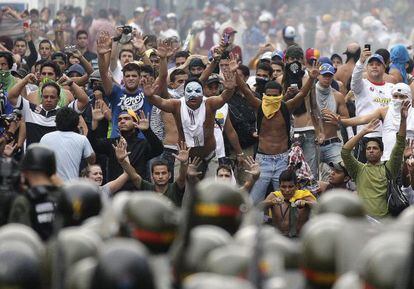Violence breaks out in Venezuela as opposition demands vote recount
The government and Capriles are accusing each other of stirring up trouble

Post-election tensions in Venezuela reached new heights on Wednesday after President-elect Nicolás Maduro and opposition leader Henrique Capriles accused each other of stirring up the violence that has left seven people dead in the aftermath of Sunday’s ballot.
Capriles and other opposition leaders said that they feared judicial persecution following their international calls for a recount and alleged that the government has ordered gangs to attack his supporters, their party headquarters and even his residence.
“If anything happens to me [...] I will hold Nicolás Maduro responsible,” Capriles said.
Maduro, who was proclaimed the winner of Sunday’s race by a margin of less than two percent, and Capriles are in a bitter battle over the opposition’s demands for a ballot-by-ballot audit. At first Maduro agreed to the recount but later changed his mind unexpectedly.
Maduro won with 50.8 percent of the vote against Capriles’ 49.0 percent, according to the electoral authority.
The political crisis has caused a profound polarization in Venezuela, just weeks after it lost its longtime leftist President Hugo Chávez, who died from cancer on March 5.
Venezuela’s top prosecutor said that at least seven people have been killed and more than 60 injured in post-election violence. One opposition lawmaker, William Dávila, said he was beaten up at the National Assembly, and appeared before cameras with a bloodied face and ruffled suit.
Maduro accused Capriles of starting the violence and said he was trying to lead a coup to topple his elected government. If the opposition didn’t respect the vote, he would be forced to “radicalize” the Bolivarian revolution that had been initiated by the late President Chávez, Maduro said, without explaining his remarks.
Maduro also said that he wasn’t going to permit the opposition to hold a march in front of the National Election Committee on Wednesday as Capriles had announced. Afterward, Capriles said he was calling off the march because the government was planning to “infiltrate” it, start trouble and blame it on him.
“To my followers: this is a peaceful quarrel. Whoever commits violence is not part of this project; they are not with me. In fact, they are harming me,” Capriles said Tuesday night during a news conference with the international press.
For the second night in a row Venezuelans across the country on Tuesday banged pots and pans from their homes and in the streets in a noisy cacerolazo protest aimed at Maduro’s incoming government.
At the news conference, the 40-year-old Capriles released evidence of some 3,200 irregularities and voting violations that allegedly took place on Sunday. Among the proof he showed were photographs of what appeared to be election officials looking over the shoulders of voters at some polling stations. He said that if the CNE doesn’t bow to the opposition’s demand for a recount he will take his complaint to the United Nations, the Organization of American States (OAS) and other international forums.
Leopoldo López, another prominent opposition leader, said that the government had planned on arresting him, Capriles and others on charges of destabilizing the country. López posted a photograph of an arrest warrant signed by a judge on his Twitter account and said that the government wanted to intimidate the opposition.
On Friday, Maduro, 50, will be sworn in as Chávez’s successor in a ceremony where several heads of state are expected to attend. Among those are Nicaraguan President Daniel Ortega, Argentinean President Cristina Fernández de Kirchner and Iranian President Mahmoud Ahmadinejad. More than 15 countries have said they will send official delegations to the inauguration, Information Minister Ernesto Villegas said.
Regardless of whether a recount will be held, Venezuela’s immediate future remains unclear. Maduro’s slight margin of victory has raised doubts about whether the loose, disparate alliance of leftist groups that formed around Chávez during his 14 years in power can hold together without him.
The opposition itself comprises a wide-ranging coalition of parties from right to left on the political spectrum.










































